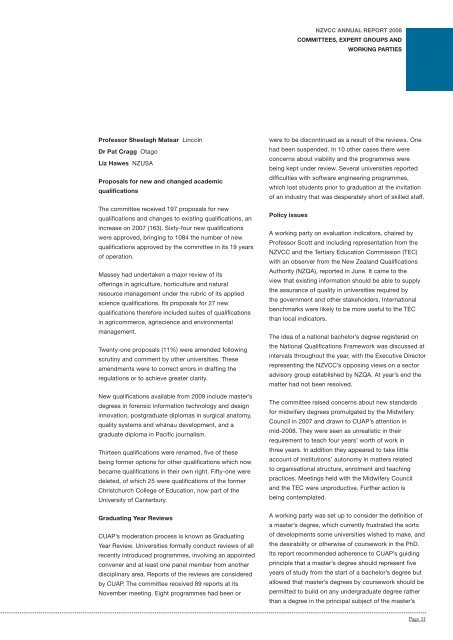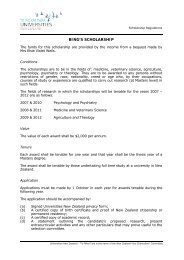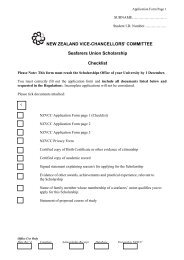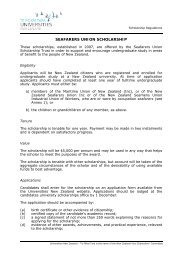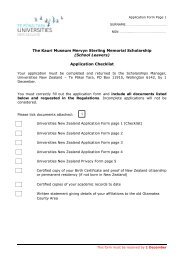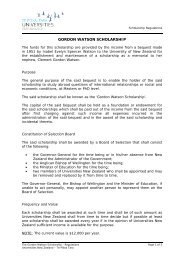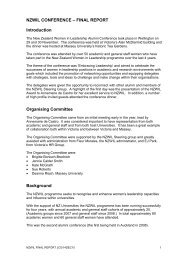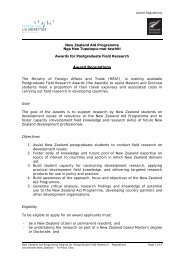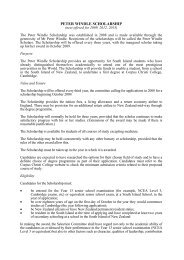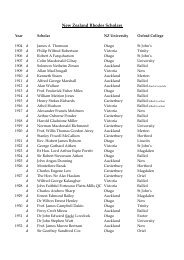annual report - Universities New Zealand - Te PÅkai Tara
annual report - Universities New Zealand - Te PÅkai Tara
annual report - Universities New Zealand - Te PÅkai Tara
You also want an ePaper? Increase the reach of your titles
YUMPU automatically turns print PDFs into web optimized ePapers that Google loves.
NZVCC ANNUAL REPORT 2008COMMITTEES, EXPERT GROUPS ANDWORKING PARTIESProfessor Sheelagh Matear LincolnDr Pat Cragg OtagoLiz Hawes NZUSAProposals for new and changed academicqualificationsThe committee received 197 proposals for newqualifications and changes to existing qualifications, anincrease on 2007 (163). Sixty-four new qualificationswere approved, bringing to 1084 the number of newqualifications approved by the committee in its 19 yearsof operation.Massey had undertaken a major review of itsofferings in agriculture, horticulture and naturalresource management under the rubric of its appliedscience qualifications. Its proposals for 27 newqualifications therefore included suites of qualificationsin agricommerce, agriscience and environmentalmanagement.Twenty-one proposals (11%) were amended followingscrutiny and comment by other universities. Theseamendments were to correct errors in drafting theregulations or to achieve greater clarity.<strong>New</strong> qualifications available from 2009 include master’sdegrees in forensic information technology and designinnovation, postgraduate diplomas in surgical anatomy,quality systems and whänau development, and agraduate diploma in Pacific journalism.Thirteen qualifications were renamed, five of thesebeing former options for other qualifications which nowbecame qualifications in their own right. Fifty-one weredeleted, of which 25 were qualifications of the formerChristchurch College of Education, now part of theUniversity of Canterbury.Graduating Year ReviewsCUAP’s moderation process is known as GraduatingYear Review. <strong>Universities</strong> formally conduct reviews of allrecently introduced programmes, involving an appointedconvener and at least one panel member from anotherdisciplinary area. Reports of the reviews are consideredby CUAP. The committee received 89 <strong>report</strong>s at itsNovember meeting. Eight programmes had been orwere to be discontinued as a result of the reviews. Onehad been suspended. In 10 other cases there wereconcerns about viability and the programmes werebeing kept under review. Several universities <strong>report</strong>eddifficulties with software engineering programmes,which lost students prior to graduation at the invitationof an industry that was desperately short of skilled staff.Policy issuesA working party on evaluation indicators, chaired byProfessor Scott and including representation from theNZVCC and the <strong>Te</strong>rtiary Education Commission (TEC)with an observer from the <strong>New</strong> <strong>Zealand</strong> QualificationsAuthority (NZQA), <strong>report</strong>ed in June. It came to theview that existing information should be able to supplythe assurance of quality in universities required bythe government and other stakeholders. Internationalbenchmarks were likely to be more useful to the TECthan local indicators.The idea of a national bachelor’s degree registered onthe National Qualifications Framework was discussed atintervals throughout the year, with the Executive Directorrepresenting the NZVCC’s opposing views on a sectoradvisory group established by NZQA. At year’s end thematter had not been resolved.The committee raised concerns about new standardsfor midwifery degrees promulgated by the MidwiferyCouncil in 2007 and drawn to CUAP’s attention inmid-2008. They were seen as unrealistic in theirrequirement to teach four years’ worth of work inthree years. In addition they appeared to take littleaccount of institutions’ autonomy in matters relatedto organisational structure, enrolment and teachingpractices. Meetings held with the Midwifery Counciland the TEC were unproductive. Further action isbeing contemplated.A working party was set up to consider the definition ofa master’s degree, which currently frustrated the sortsof developments some universities wished to make, andthe desirability or otherwise of coursework in the PhD.Its <strong>report</strong> recommended adherence to CUAP’s guidingprinciple that a master’s degree should represent fiveyears of study from the start of a bachelor’s degree butallowed that master’s degrees by coursework should bepermitted to build on any undergraduate degree ratherthan a degree in the principal subject of the master’sPage 31


